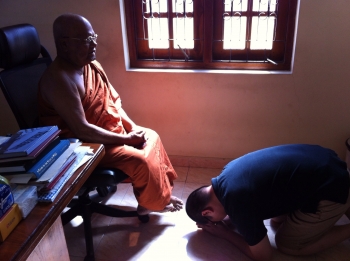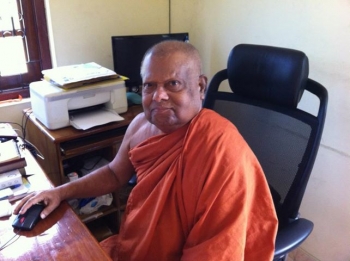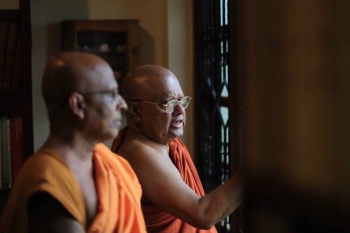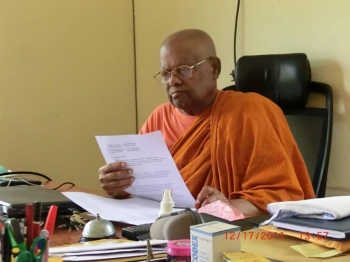The first time that I met the most Venerable Professor K?kk?palliye Anuruddha was at the 2010 Master of Buddhist Studies (MBS) orientation day at the University of Hong Kong (HKU) (1). It was also the first time that I had seen a Therav?da monk, one who wears a saffron- or burgundy-coloured robe. When it was his turn to speak, he told the audience that P?li is a beautiful language and then jokingly said that if one learnt it, one would appreciate it even more when one was retired and then he began to chant a few sentences. Immediately, I was deeply enchanted by the serene yet rhythmic sound of it, even though I did not understand its meaning. When the semester began, I enrolled in, among other courses, Basic P?li and Reading P?li Suttas, both were taught by Bhante (“Venerable Sir” in P?li) Anuruddha. Classes were conducted at Chi Lin Nunnery rather than HKU since it was where he lived (this is not a joke!) and travelling in Hong Kong’s notorious traffic to and from these places would have been too tiring for an elderly person. Little did I realize then that I would be one of his last batch of students. Due to health reasons, he returned to his native Sri Lanka after the semester was over. As a result, in the following semester, we studied P?li with him by watching videos that were taped in the previous year with Venerable Hin Tak, a Chinese monk and one of his top students at HKU, being our teaching assistant.
In class, Bhante was like a walking encyclopedia who could tell his students everything about Buddhism. In Basic P?li, his photographic memory had put us all in shame because we could never remember the declension of nouns or the conjugation of verbs correctly without consulting the textbook. For translations, he would not only select passages that were particularly meaningful to him from the Suttapi?aka but also from other key sources such as the Dhammapada. For example:
Tumhehi kicca??tappa? akkh?t?ro tath?gat?
(You yourselves should make the effort; the Buddhas can only show the way)
Pa?ipann? pamokkhanti jh?yino m?rabandhan?
(Those who practice Tranquillity and Insight Meditation are freed from the bond of Mara) (2).
And
K?yena sa?varo s?dhu
(Restraint in body is good)
s?dhu v?c?ya sa?varo
(good is restraint in speech)
Manas? sa?varo s?dhu
(restraint in mind is good)
s?dhu sabbattha sa?varo
(good is restraint in all the senses)
Sabbattha sa?vuto bhikkhu sabbadukkh? pamuccati
(A bhikkhu restrained in all the senses is freed from all ills) (3).
There were moments when Bhante was witty and humourous, too. One day in Reading P?li Suttas, he told us a funny story to illustrate the importance of being mindful. In Donapaka Sutta, “Once when the Buddha was living at Savatthi, King Pasenadi of Kosala ate a whole bucketful of food, and then approached the Buddha, engorged and panting, and sat down to one side. The Buddha, discerning that King Pasenadi was engorged and panting, took the occasion to utter this verse:
When a person is constantly mindful,
And knows when enough food has been taken,
All their afflictions become more slender
— They age more gradually, protecting their lives.
Now at that time the brahman youth Sudassana was standing nearby, and King Pasenadi of Kosala addressed him: ‘Come now, my dear Sudassana, and having thoroughly mastered this verse in the presence of the Buddha, recite it whenever food is brought to me. And I will set up for you a permanent offering of a hundred kahaapanas every day.’ ‘So be it, your majesty,’ the brahman youth Sudassana replied to the king.
Then King Pasenadi of Kosala gradually settled down to [eating] no more than a cup-full of rice. At a later time, when his body had become quite slim, King Pasenadi stroked his limbs with his hand and took the occasion to make this utterance:
Indeed the Buddha has shown me
Compassion in two different ways:
For my welfare right here and now,
And also for in the future.” (4)
Outside the classroom, Bhante was always ready to look after his friends and students. Last January, when I was visiting Sri Lanka, he invited me to stay at Sati Buddhist Education Centre, his home in Colombo which he had founded to educate novice monks and nuns by hiring tutors to teach them English and computing, which he firmly believed was crucial for their education in addition to their monastic training because he had not had the opportunity to study English until he attended evening school as an adult. Whilst I was living there, he kindly asked his attendant to prepare three four or five-course meals for me each day, sometimes even with seasonal fruits, organic vanilla as well as strawberry ice-cream and ayurvedic ginger beer! When I was traveling by myself to some of the UNESCO World Heritage Sites such as Polonnaruwa, Anuradhapura and Kandy, he would give me a call every morning to make sure that everything was alright and that I was safe.
Back in Sati, sometimes in the evening, Bhante and I would sit down on the balcony, watching the moonlight, bats flying and fireflies glowing in the darkness. When I was lost in time, he, who was famous for his razor sharp mind, was not. One evening whilst we were chatting, he suddenly stood up and said, “Goodnight. It’s time to go to bed. See you tomorrow.” After he entered his room, I went to mine, looked at my mobile, and it read 10:01 pm. The next evening, we sat down on the balcony and chatted again. He suddenly stood up and said, “it’s time to watch the news” and off he went to his room. I then went to mine, checked my mobile, and it read 5:59 pm. A disciplined monk, Bhante watched the news and went to bed at 6:00 pm and 10:00 pm, respectively, every day. His mindfulness was so extraordinarily strong that he would know exactly what time it was even without a timepiece around. Or would it be his “psychic power”?
During our conversations, Bhante told me that amongst his brothers, none had survived beyond the age of 55; therefore, he was grateful to have lived through his 80s. Whilst pursing his doctoral studies in the United Kingdom, he could only spend one Pound Sterling per day and had to cook by himself. When his mother passed away, he did not return home to attend her funeral because if he had done, he would not have had enough money to continue to stay in the UK until his graduation. I asked him if he had been sad. He replied calmly: “death is inevitable.”
All of Bhante’s physical pain and suffering from mouth cancer finally came to an end in the morning on 29 September 2013. He had taught us that even an Arahant, who is fully liberated from greed (lobha), anger (dosa) and delusion (moha), like the Buddha, is still subject to them.
By now, Bhante must be happily playing cricket, his all-time favourite sport, with many Arahants while the Devas are his fans and cheerleaders! With his brilliant sense of humor and unlimited friendliness (mett?) (5), I have no doubt that he will forgive me for being naughty for making this joke.
Sukh? hotu (May you be well and happy), our beloved Bhante!
(1) I am indebted to John Shannon, an MBS graduate and former student of Bhante Anuruddha, for kindly revising the first draft.
(2) Verse 276
(3) Verse 361
(4) Donapaka Sutta: King Pasenadi Goes on a Diet (SN 3.13), translated from P?li by Andrew Olendzki. Access to Insight, 16 June 2010, http://www.accesstoinsight.org/tipitaka/sn/sn03/sn03.013.olen.html
(5) To Bhante, “unlimited friendliness” is an even more accurate meaning than “loving-kindness.”


















